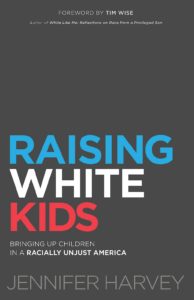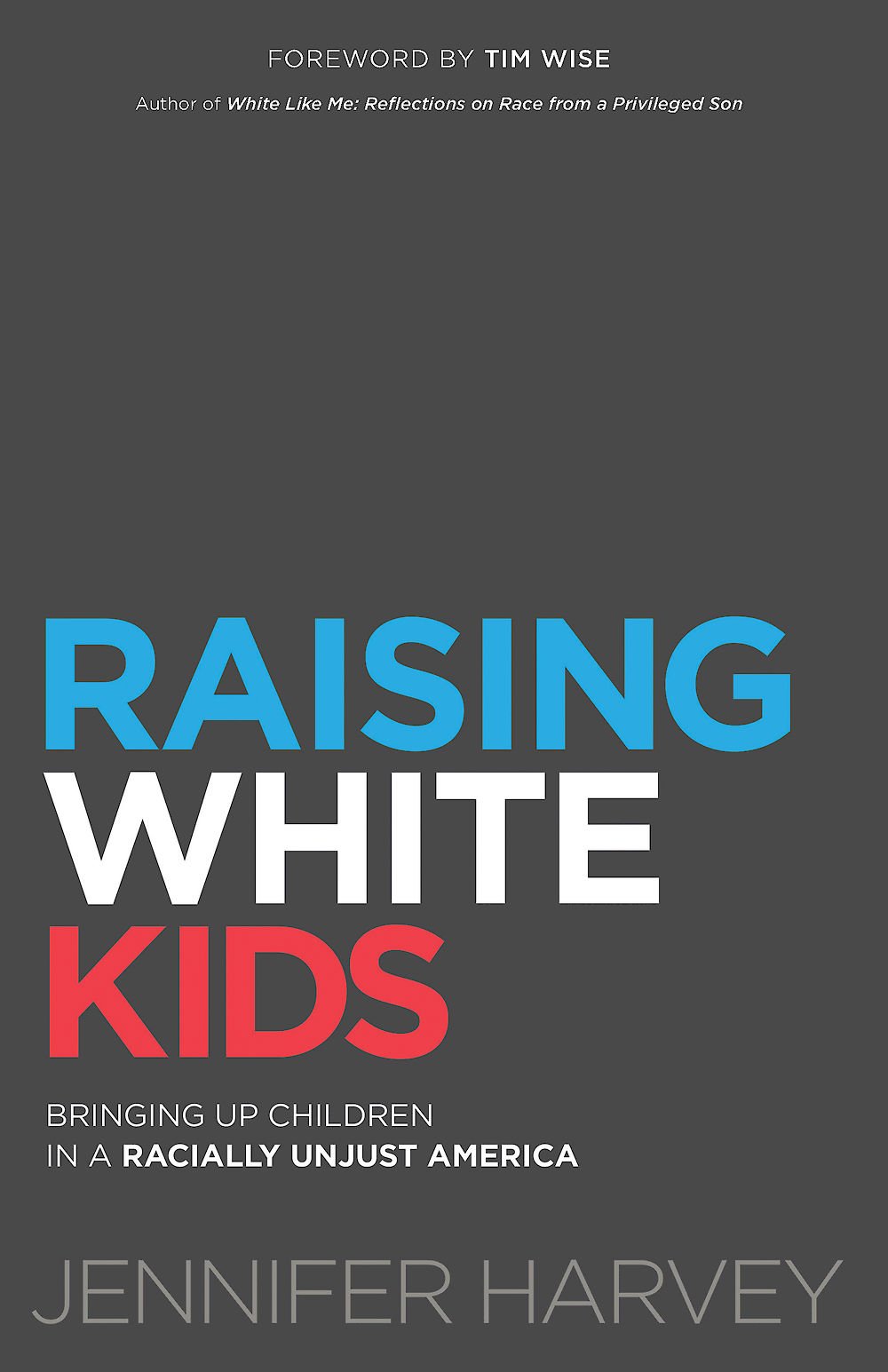 If you’re a white parent of white children and you’ve been wondering how to begin equipping your children (and yourself) to understand & resist racism, Raising White Kids: Bringing Up Children in a Racially Unjust America by Jennifer Harvey is a good, non-intimidating starting point … and I have two copies of Raising White Kids to give away, courtesy of Abingdon Press. Check out the details at the end of this blogpost.
If you’re a white parent of white children and you’ve been wondering how to begin equipping your children (and yourself) to understand & resist racism, Raising White Kids: Bringing Up Children in a Racially Unjust America by Jennifer Harvey is a good, non-intimidating starting point … and I have two copies of Raising White Kids to give away, courtesy of Abingdon Press. Check out the details at the end of this blogpost.
Jennifer Harvey offers informative, non-anxious space for white parents of white children to understand the development of racial identity, to experience grace for the mistakes that inevitably accompany parenting, and to be attentive to the ongoing work of equipping white children to resist racism. White parents who find themselves wondering how to raise race-conscious white children will find Raising White Kids to be a helpful and practical starting point.
But it truly is only a starting point. If you’ve been digging into critical race theories and engaging anti-bias material, some of Raising White Kids will feel rudimentary — such as understanding the difference between individual bias and systemic racism.
If basic tips & practical encouragement are precisely what you’re seeking to help you put your convictions about the importance of anti-racism together with the importance of parenting, Raising White Kids can help you begin the work of race-conscious parenting … but then be sure to keep going. There are additional critical conversations for white parents to have with their white kids that Raising White Kids doesn’t resource. Two in particular that come to mind for me:
1. Relationships: Raising White Kids doesn’t explicitly encourage self-reflection on white families’ choices of social spaces, circles, and relationships. A variety of research on anti-bias suggests that relationships across lines of race are critical to lessening racial bias, and many of Jennifer Harvey’s own stories reflect this impact. (My daughter, in her 50% Black – 50% white high school, would promptly debunk those studies by telling you about the racism on display from her white peers despite their daily engagement with students of color.) The types of relationships that can lead toward lessened bias have deeper roots than simply “parallel play,” and so as parents it’s important to ask ourselves, “Who do our kids see us loving and who do our kids see us choosing as our neighbors?” Raising our kids to understand race & racism is intellectual work, but demonstrating anti-racist commitments through our daily habits & relationships is spiritual-emotional-corporate work. (Sidebar: choosing to move into a predominantly non-white neighborhood as part of that location’s gentrifying “flip” is not a demonstration of anti-racist commitments.)
2. Faith: Raising White Kids isn’t written with an explicitly religious perspective, which is perfectly fine, but if you’re a white parent of white kids and you’re raising your kids in a predominantly white church, the hard truth is that the whiteness of your theology will need some intentional work and prayerful exorcism. The white Jesus in your children’s Bibles, the pale Jesus in your church’s stained glass, the framed & faded picture of white Jesus knocking at the door, even a beloved crucifix — all of these and the theologies they represent are literally & figuratively enmeshed with colonialism, with racism, with chauvinistic saviorism. And sometimes the faith-filled desire to teach our white kids that they are urgently needed for anti-racism dances on the line of white saviorism. Jennifer Harvey acknowledges briefly that the work of anti-racism is a work that whites join, not start, but I wish she had asked of her readers, “How do white parents teach white kids to resist racism while not inadvertently teaching their kids that they are (or should be) the heroes of anti-racism?” For a closer look at the problem of white saviorism and an excavation of white faith, I recommend James Perkinson’s White Theology.
I am a white parent of Black children, so Raising White Kids isn’t for me. I’m not the intended audience. I wanted to read the book for that reason. I also didn’t want to read the book for that reason. But whites talking to whites is essential anti-racist work, and it’s a task Raising White Kids undertakes. As Ijeoma Oluo wrote last year, “As much as I’d like you to see me — as much as I’d like systemic racism to simply be a problem of different groups not seeing each other — I need you to see yourself, really see yourself, first. This is the top priority.” Raising White Kids takes this priority seriously and meets parents on the landscape and in the language of the white privilege of their children. White privilege talks to white privilege.
Unfortunately in my experience, white privilege talking to white privilege has a bad habit of tiptoeing around white comfort, and it’s the privileging of white comfort that makes me uncomfortable with this book.
Several years ago, I wrote that “conversations about race that do not result in conversions about race miss the urgency of the Gospel.” While I assume that Jennifer Harvey aims to achieve conversions about race as it relates to the parenting of white children, I fear that Raising White Kids spends so much time & tone on treating white parents of white children gently that it threatens to be yet another uneventful conversation about race. For heaven’s sake, the book handholds parents through the work of understanding that it’s not disastrous to say the “R” word (racism) and not “prophetic” to talk nicely about MLK once a year.
White comfort is presumed to be the route to white conversion.
The lack of de-centering discomfort in Raising White Kids is practically the definition of white privilege. Harvey illustrates her own employment of such privilege when she shares the story of deciding whether to take her kids to a #BlackLivesMatter protest following the killing of Michael Brown: “We have to make careful judgments about whether or how to engage our children in dialogues about realities so serious, heavy, and frightening that they may be simply too much for them.” As a parent of Black children, whether and when to have those dialogues are not optional.
Of course, we whites all need to start learning somewhere, somehow, sometime. My own learning has included some massive & public missteps, and it’s still not done. It is never done.
So after Raising White Kids helps you get started, I encourage you to seek out books about race & racism that don’t center whiteness or white comfort. Dig deeper into white discomfort by engaging the sociological, theological, fictional, poetic works of authors of color. And for a better understanding of the development of racial identity, don’t just read Raising White Kids‘ summary of Beverly Daniel Tatum’s Why Are All the Black Kids Sitting Together in the Cafeteria? Go and read Tatum’s book in full.
But first, if Raising White Kids can be useful to you, drop me an email with the subject “Raising White Kids” by Thursday, March 1st at 5:00pm eastern. All names will be placed in a hat for a random drawing, and I’ll contact two winners for their mailing addresses to send the free copies of Raising White Kids. None of the email addresses that I receive as a result of folks entering the book giveaway will be shared, and you won’t receive unsolicited emails from me after the giveaway has ended.


I’d love to read and review Raising a White Kids.
Thanks for inviting me to participate in the drawing!
Glad to put your name in the drawing!
I really appreciate your perspective especially after just clicking post on my own review. There were a bunch of things that made me uncomfortable about this book — and I know I still have A LOT of work to do — but I felt that this book was the beginning of a conversation. Harvey felt like she was introducing a conversation and so maybe this is the first book parents might read on the topic but surely not the last. I did expect a bit more about the debunking faith stuff and that was completely absent from this text. Strange given her previous book.
I just popped over to read your review, Elsa. Glad you liked the book. I agree that Harvey is trying to start the conversation, which is useful, but I think she could do that and still push readers. To me the book feels … lite.